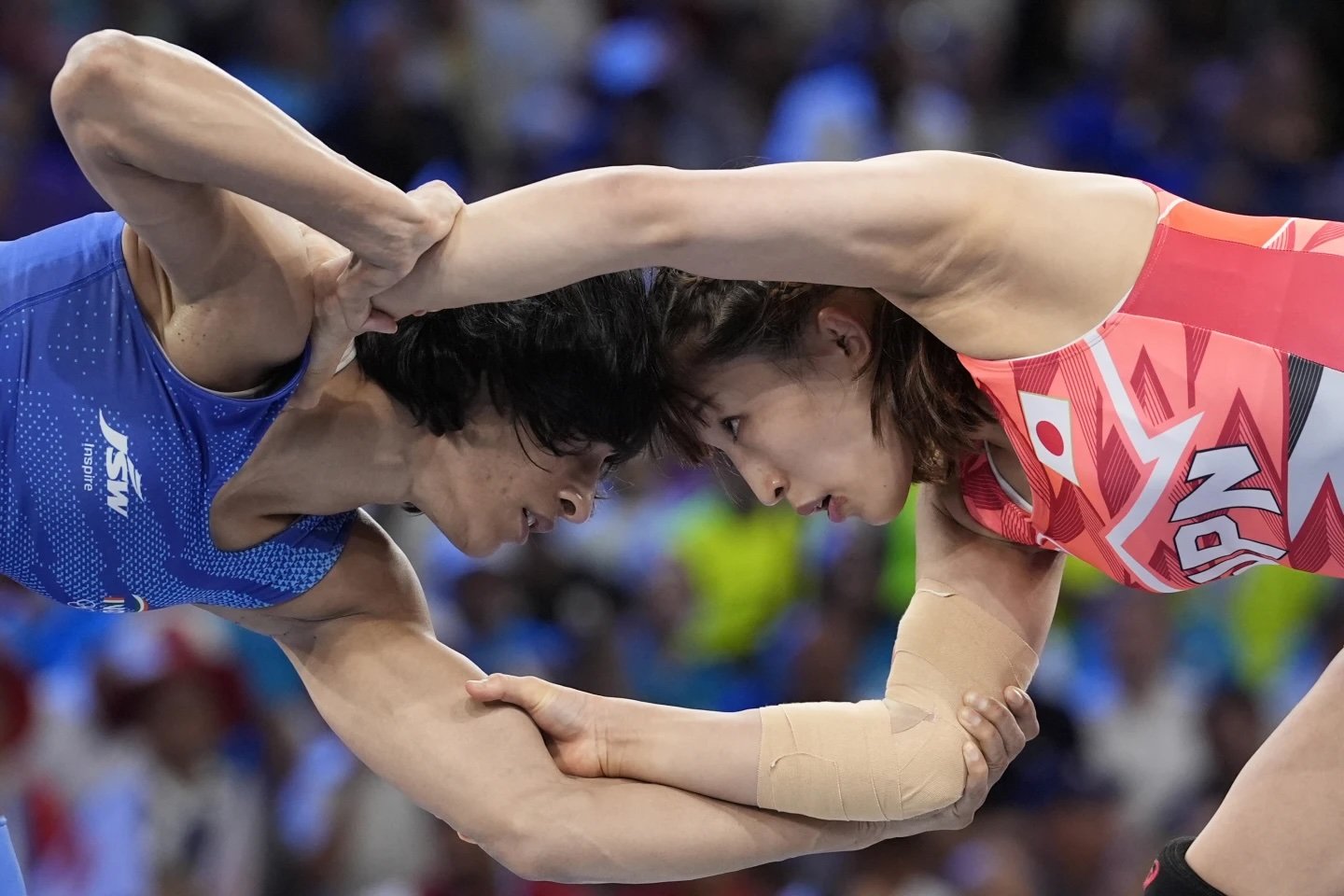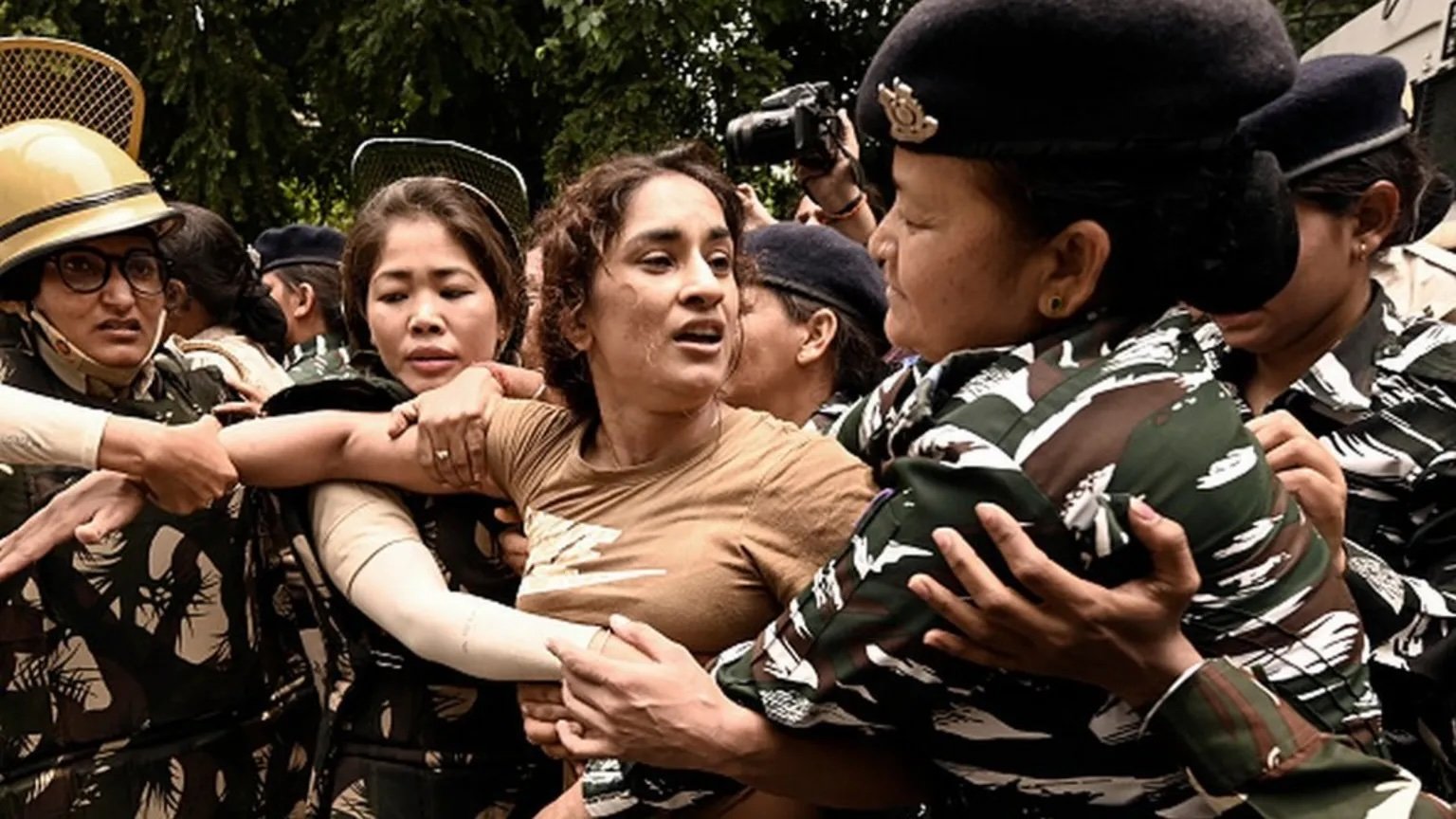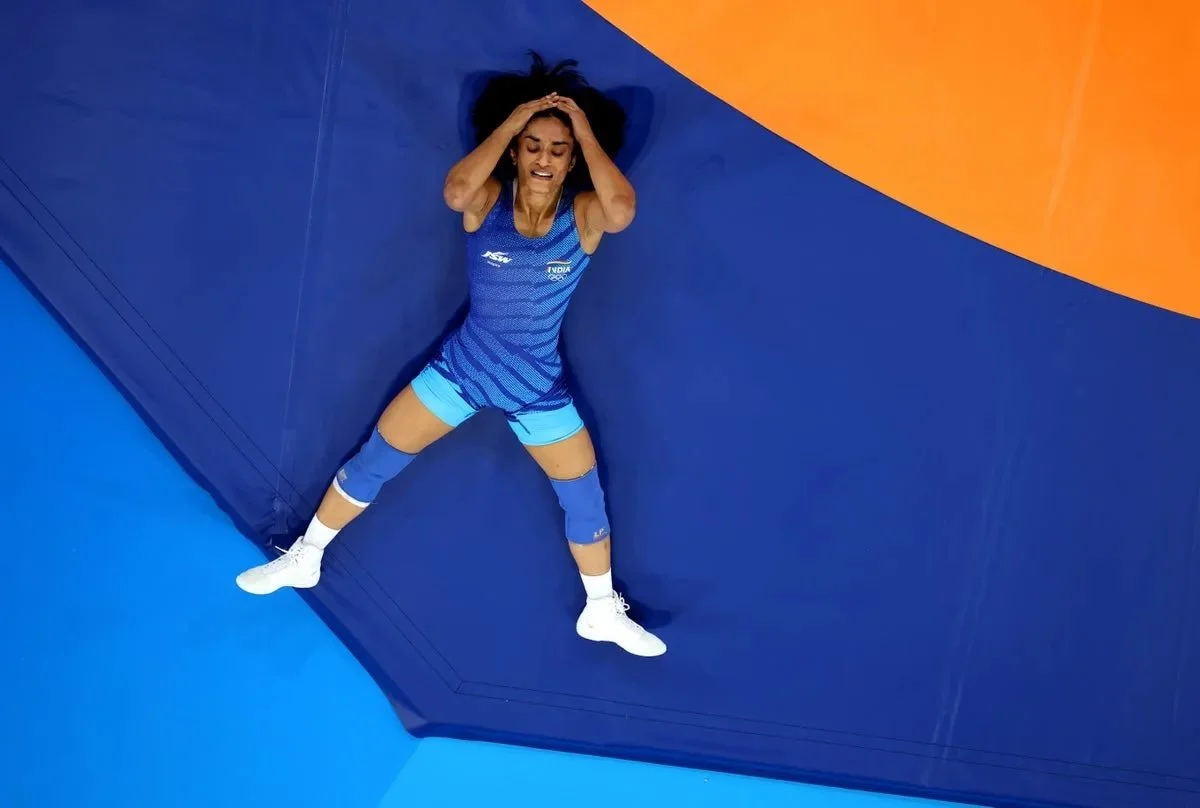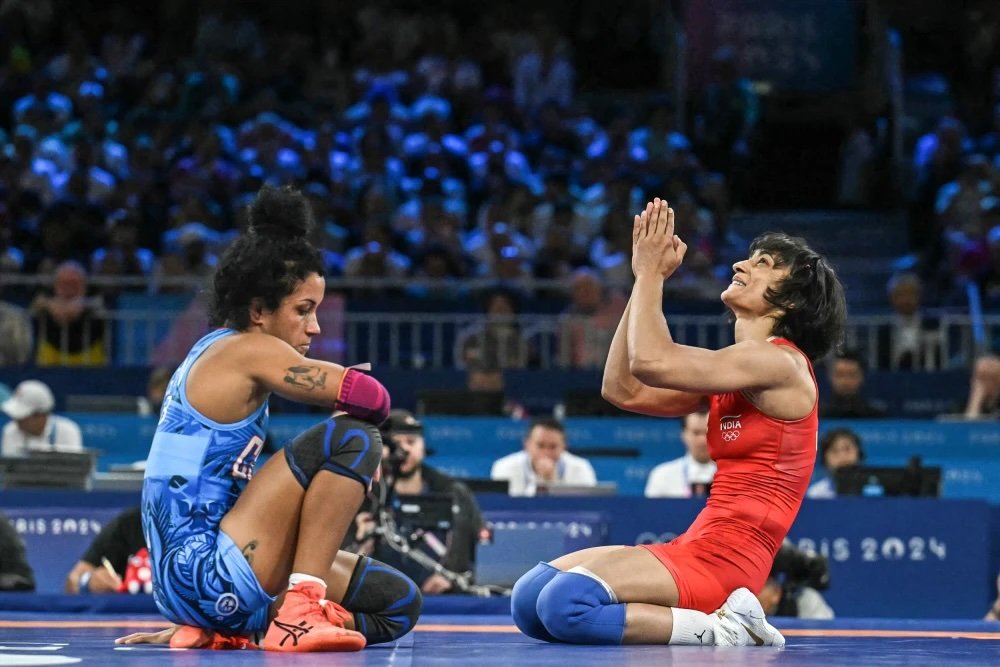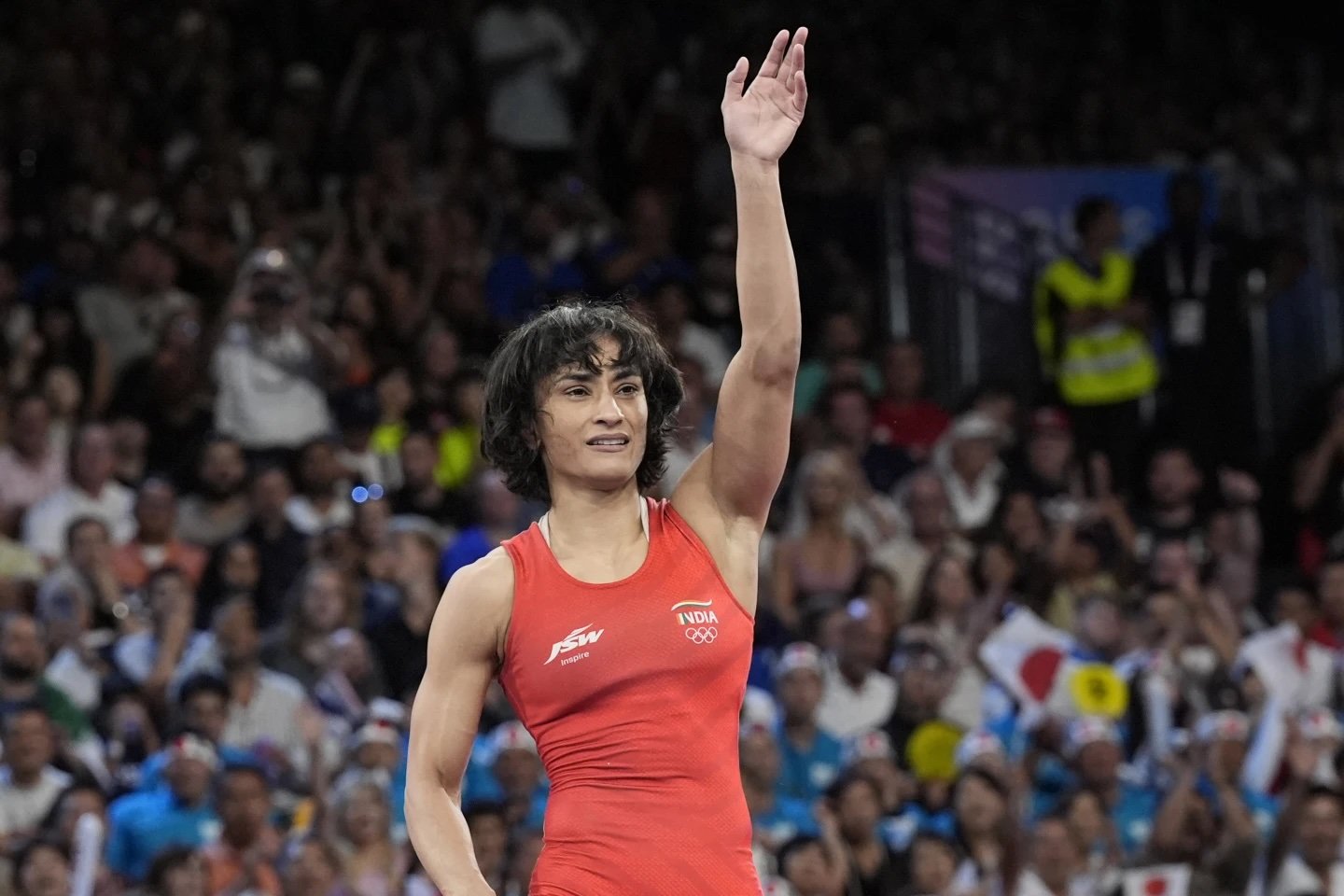Vinesh Phogat’s Olympic Dream Might Be Broken, But Not Her Fighting Spirit
Trigger Warning: Sexual Assault and Violence
Last year, three-time Olympic wrestler from India, Vinesh Phogat, was dragged and beaten by Indian policemen on the roads in Delhi, India. She was protesting against the then-president of the Wrestling Federation of India (WFI), Brij Bhushan Sharan Singh.
Yet today, she is a national hero — not because she beat the No. 1 ranked wrestler in the 50 kg freestyle at the Paris Olympics or because she became the first woman from India to make an Olympic wrestling final. But because she chose to fight the very system that once pushed her to give up wrestling altogether.
AP
Unfortunately, Phogat was disqualified from competing for the gold medal because she was 100 grams overweight the morning of the final match against USA’s Sarah Hildebrant. Phogat did everything physically possible to cut those 100 grams — she cut her hair, stayed up all night in the sauna, did not eat or drink water, and exercised without sleep. While the ruling upholds the IOC’s regulations, Phogat’s inability to reach the finals had more significant implications than just losing out on a gold medal match.
Winning the gold medal would have symbolized the triumph over the challenges and hardships that Phogat and numerous female wrestlers had to endure due to the actions of Brij Bhushan and the WFI.
Getty Images
In January 2023, Phogat and fellow Olympians Sakshi Malik and Bajrang Punia initiated public protests against Brij Bhushan Singh. The protests, which included over 30 wrestlers and hundreds of supporters, aimed to hold Singh accountable and demand safer working conditions in the sport.
Singh’s 12-year tenure as WFI president was marked by numerous allegations of abuse. These included forcing athletes to engage in sexual acts, inappropriate touching, and retaliating against those who refused his advances by withholding opportunities and services. The scale of abuse under Singh's leadership is believed to be much larger than what has been officially reported. Other WFI officials, including former Secretary Vinod Tomar, are also facing charges for similar offenses.
The wrestler's protests were met with harsh retaliation from authorities. In May 2023, Delhi Police cracked down on the protest site, arresting and detaining demonstrators, including the Chairperson of the Delhi Commission for Women, Swati Maliwal. The police’s actions led to injuries among the protestors and further highlighted the challenges of holding powerful figures accountable. In June 2023, India’s Supreme Court ordered an investigation into the charges against Singh. This led to his trial for assault, stalking, and sexual harassment, which began in April 2024.
Getty Images
Despite the protests, Singh’s influence remained evident. In December 2023, Sanjay Singh, a close associate of Brij Bhushan Singh, was elected as the new WFI president, raising concerns about the lack of systemic reform. The Sport & Rights Alliance and other organizations called for a comprehensive investigation into Singh's actions and the culture that enabled the abuse for over a decade. However, as of July 2024, the investigation ordered by India’s Department of Sports has not been made public, leaving many cases of abuse unaddressed.
The systemic issues within Indian sports were highlighted by the response to these allegations. Athletes who testified against Singh before a special committee faced skepticism and victim-blaming attitudes. The committee’s demand for video or audio evidence, rather than relying on testimonies, discouraged other survivors from coming forward. This lack of support and belief from the authorities only compounds the trauma experienced by the victims and makes achieving justice even more difficult.
Women all around the world are casualties of this ideology. They are afraid to speak up and call out the bad behavior men perpetuate. Why? Because it is rarely accepted at face value. Estimates published by WHO indicate that “globally, about 1 in 3 (30%) of women worldwide have been subjected to non-partner sexual violence in their lifetime.” And yet, few believe a woman when she accuses a man of any type of sexual crime.
Getty Images
According to UNESCO, “21% of women and girls globally have suffered sexual abuse in a sporting environment during childhood, nearly double the rate of their male counterparts.” Wrestling, one of India’s oldest sports, has traditionally been male-dominated, but pioneering female wrestlers like Geeta Phogat and Sakshi Malik have increased the sport’s popularity among women. However, this increased participation has also exposed the vulnerabilities faced by female athletes in a society where abuse is often overlooked unless it is extreme.
“Indian society normalizes abuse and harassment,” Phogat said in a testimony to The Sport & Rights Alliance. “They will only take it seriously when the assault is gruesome. But it is like how we fight a wrestling bout. Whether we lose by one point or by ten, we lose. Whether the assault is big or small, it is an assault. An act against our will.”
Getty Images
The day Phogat won her semi-final in Paris and advanced to the finals, she was deemed a champion and hero. Everyone who doubted her fight against systemic sexual violence in WFI became fans of her game. But a large majority of onlookers will not realize that Phogat’s journey to the Paris Olympics 2024 has been marred with multiple ACL injuries, personal struggles, the trauma of protesting, being a victim of sexual abuse, and being subjected to misogynistic name-calling by her countrymen.
While the Indian wrestlers have not yet received justice, a fire has been lit. Phogat’s achievements have once again drawn attention to the reality of the wrestling landscape in India. The wrestlers’ struggle for justice reflects the broader issues within any sports system, where powerful officials are often shielded from accountability.
AP
Today, because of Phogat, a young girl in India might dream of representing her country in the Olympics and winning a wrestling gold. Because of Phogat, she will also remember that speaking up against any form of abuse is not a sign of weakness but a display of immeasurable valiance.
“If by standing up for all the women in wrestling, my career in this sport will end, I am ready." - Vinesh Phogat


